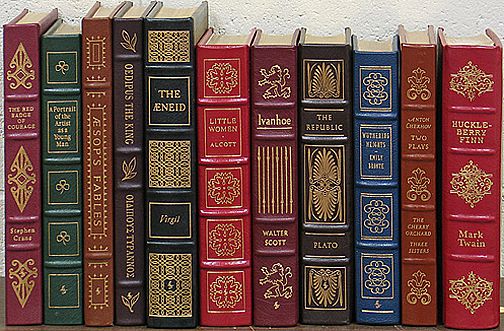
Why You Should Revisit the Classics From High School

I must have been a nightmare in high school English class. English was my favorite subject, and my friends and I talked about books with the same mania we hoarded quarters for the arcade and wolfed down mozzarella sticks at Denny’s. I even had English teachers I liked, and I keep in touch with them today. But with the self-righteousness only an adolescent boy can muster, I saw those English teachers as criminals who had stolen books I would have enjoyed beside a swimming pool or in a beanbag chair, and turned them into something to be dissected, tested, essayed upon, and graded. I didn’t care what they did to Calculus or Chemistry or Spanish. Just leave my damn books alone and don’t spoil them with … with … education!
The jerks.
What’s next, turncoats? An in-class essay on The Legend of Zelda?
So I spent the better part of my high school English career beating this drum filled with nonsense and generally making everyone else’s experience a drag. I complained loudly that Homer was wasting valuable time by including Telemachus’s story in parallel with Odysseus’s, that of course Gregor Samsa was a cockroach, not just “an insect” so move along please, and that Joe Christmas was a self-destructive moron so why was Faulkner wasting my afternoon with 500 pages of Joe Christmas acting moronically?
I’m a little wiser now. I know the canonical books of high school are called “classics” for a reason, and it’s not because some scold on Sunday morning TV or a secret cabal of English teachers declared them so. But that doesn’t change the fact that most readers really started off on the wrong foot and have an unbalanced relationship with the classics, defined by their colossal standing and our adolescent feeling of not quite grasping them, and being graded down because of it.
When returning to them later in life, we find the classics imprisoned in amber. Either they’re lost monuments from 10th grade or old sages we’ve kept on the shelf thanks to our own literary obsessions. We can either be the kind of reader that read Invisible Man in high school and never looked at it again, or we can be the kind of nut who reads it once a quarter and gets angry when someone doesn’t appreciate it exactly as much as we do.
Those of us who love the simple act of reading, I suspect, are somewhere in between. Let us then redefine our relationship to classics with clear eyes, open minds, and the wisdom of our lives now. I have to believe that classics earn their stripes containing something not just enlightening, but sensual, not just provoking, but practical. We should reread these great books not just because they are great works of art. By definition if a great book has run the gauntlet of time, shouldn’t it also point us toward how to lead a great life?
It’s with that foolish optimism that I revisited both the great books I was assigned in high school and those most typically assigned in high schools across America.* I reread them from the point of view of a married 38-year-old man with a day job. A dedicated reader sure, but also an omnivore of the 21st century, with all the competing demands of movies and television, music, video games, and social media. And while I love all of those things too, perhaps growing older and living in this overclocked age has given me new appreciation for art created to last.
Former Paris Review poetry editor Meghan O’Rourke wrote in her memoir, The Long Goodbye, that part of her understanding of her mother’s death was obsessive rereadings of Hamlet. For someone in Ms. O’Rourke’s line of work, this makes perfect sense. A truck driver might seek to understand his or her mother’s death via a long road trip. Were my mother to pass away, I’d probably cope with repeated viewings of The Simpsons and an open jar of peanut butter. The point: Making an argument for the practicality of great literature does not undermine its greatness but supports it.
It would be a crime to miss out on great books entirely because they cast too intimidating a shadow or remind us of who we used be. I used to be a self-righteous imbecile. I am beyond grateful to know a little bit better now. Let us enjoy these books now, not just because they are great, not just because they are useful, but because we are now in a position to enjoy them much, much more.
They haven’t changed. We have. We are ready for them.
* Note: I came up with a list of fifty books to read by using syllabi from my own high school English teachers, the College Board’s list of books most cited on Advanced Placement English exams, and lists of canonical books cited in my two favorite texts on the subject, Clifton Fadiman’s The Lifetime Reading Plan (1999 edition, the year he died) and Harold Bloom’s How to Read and Why (2002).
———
About the author: Kevin Smokler (@weegee) is the author of the essay collection Practical Classics: 50 Reasons to Reread 50 Books you Haven’t Touched Since High School, just recently released from Prometheus.
